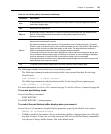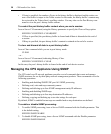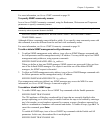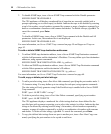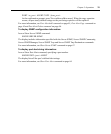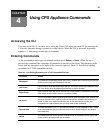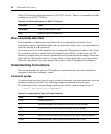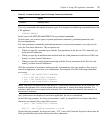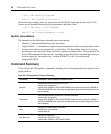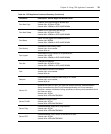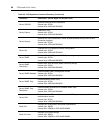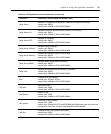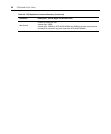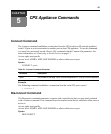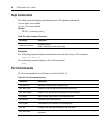
Chapter 4: Using CPS Appliance Commands 37
Not every command will contain all syntax types. For example, the following command reboots the
CPS appliance.
>SERVER REBOOT
In this case, both SERVER and REBOOT are positional commands.
In most cases, one or more spaces separate positional commands, positional parameters and
keyword parameters.
For most positional commands, positional parameters or keyword parameters, you only need to
enter the first three characters. The exceptions are:
• When you specify a terminal type with the Type parameter in the Server CLI command, you
must enter all characters.
• When you specify an authentication method with the Auth parameter in the Server SSH com-
mand, you must enter all characters.
• When you specify control signal monitoring with the Power parameter in the Port Set com-
mand, you must enter all characters.
With the exception of usernames and passwords, commands are not case sensitive; they may be
entered in uppercase, lowercase or a combination. For example, all of the following commands
are correct.
> PORT 2 SET BAUD=57600 FLOW=XON
> POR 2 SET BAU=57600 FLOW=XON
> por 2 Set Baud=57600 flow=xon
> port 2 set baud=57600 flow=xon
NOTE: Usernames and passwords are case sensitive. These values are stored exactly as you enter them. For
example, the username “Ann” must be entered with an uppercase “A” and all other letters lowercase. The
username “ANN” will not be accepted as the username “Ann.” Usernames and passwords must contain 3-16
alphanumeric characters.
Any syntax errors are displayed, and where applicable, the error is underlined.
In the following example, the keyword parameter “baud” is misspelled. Even if more than three
characters are entered, they must all be correct.
> port 2 Set Baux=57600 flow=xon
----
ERR 26 - SET keyword parameter invalid
In the following example, the keyword value “576” is not valid. Numeric keyword values must be
fully specified and may not be shortened to three characters.
XONXOF Keyword value.
Table 4.3: Command Syntax Types in Example Command (Continued)
Value Syntax



